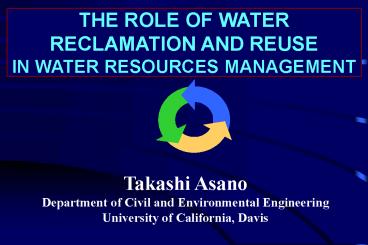Wastewater Reclamation, Recycling and Reuse - PowerPoint PPT Presentation
1 / 58
Title: Wastewater Reclamation, Recycling and Reuse
1
THE ROLE OF WATER RECLAMATION AND REUSE IN WATER
RESOURCES MANAGEMENT
Takashi Asano Department of Civil and
Environmental Engineering University of
California, Davis
2
The Role of Water Reuse - 1
- Concept of sustainable water resources
- Water resources development-California as an
example - Drought and dependable water supply
- Water recycling and reuse as an innovative water
resource
3
The Role of Water Reuse - 2
- Seven categories of water reuse - examples
- Treatment technologies and process reliability
- How safe is water reuse?
- Future perspectives - all living species in
harmony
4
(No Transcript)
5
(No Transcript)
6
(No Transcript)
7
(No Transcript)
8
1995, by Ray Sterner, Johns Hopkins University
9
(No Transcript)
10
(No Transcript)
11
(No Transcript)
12
(No Transcript)
13
(No Transcript)
14
(No Transcript)
15
(No Transcript)
16
(No Transcript)
17
(No Transcript)
18
(No Transcript)
19
(No Transcript)
20
(No Transcript)
21
(No Transcript)
22
(No Transcript)
23
(No Transcript)
24
(No Transcript)
25
(No Transcript)
26
Benefit of Water Reuse
- Important element of integrated water resources
management - Treated effluent is used as a water resource for
beneficial purposes - The wastewater is kept out of streams, lakes, and
beaches thus reducing pollution of surface water
and groundwater
27
Historic Development
- 1890 Mexico City - Drainage canals built to
irrigate crops - 1912 Golden Gate Park - watering lawns/ponds
- 1926 Grand Canyon National Park - toilet flushing
- 1942 Bethlehem Steel Co. Baltimore - metals
cooling - 1961 Irvine Ranch Water District - urban
irrigation - 1969 Windhoek, Namibia - augmentation of potable
water - 1969 Wagga Wagga, Australia - landscape
irrigation - 1977 Dan Region Project, Israel - recharge/ag.
water - 1984 Tokyo Metro Government Japan - toilet
flushing - 1989 Costa Brava, Spain - golf course irrigation
28
Categories of Reuse
- 1. Agricultural Irrigation
- 2. Landscape Irrigation
- 3. Industrial Reuse
- 4. Groundwater Recharge
- 5. Recreational and Environmental
- 6. Nonpotable Urban Reuses
- 7. Potable Reuse
29
(No Transcript)
30
(No Transcript)
31
(No Transcript)
32
(No Transcript)
33
(No Transcript)
34
(No Transcript)
35
Orange County Water Factory 21
Granular Activated Carbon
Chlorine Disinfection
Deep Well Injection
Lime Clarification
Recarbon-ation
Filtration
Reverse Osmosis
Aquifer Recharge
Since 1976 (21 years of operation) 21 million M3/
yr (15 mgd) No more than 5 of the reclaimed
water actually comprises the domestic supply No
observed water quality degradation that
constitutes a public health concern
36
(No Transcript)
37
(No Transcript)
38
(No Transcript)
39
(No Transcript)
40
(No Transcript)
41
(No Transcript)
42
(No Transcript)
43
(No Transcript)
44
(No Transcript)
45
(No Transcript)
46
(No Transcript)
47
(No Transcript)
48
(No Transcript)
49
(No Transcript)
50
(No Transcript)
51
How safe is water reuse?
- ? Acceptable health risks debate
- Absolute risk vs. relative risk
- ? Microbiological risk assessment
- Enteric virus control by treatment technologies
- Regulatory oversight
- ? Chemical exposure risk assessment
52
Everything is Toxic and Hazardous
53
(No Transcript)
54
(No Transcript)
55
(No Transcript)
56
(No Transcript)
57
Adapted from Du Pont PERMASEP Permeators
58
(No Transcript)































